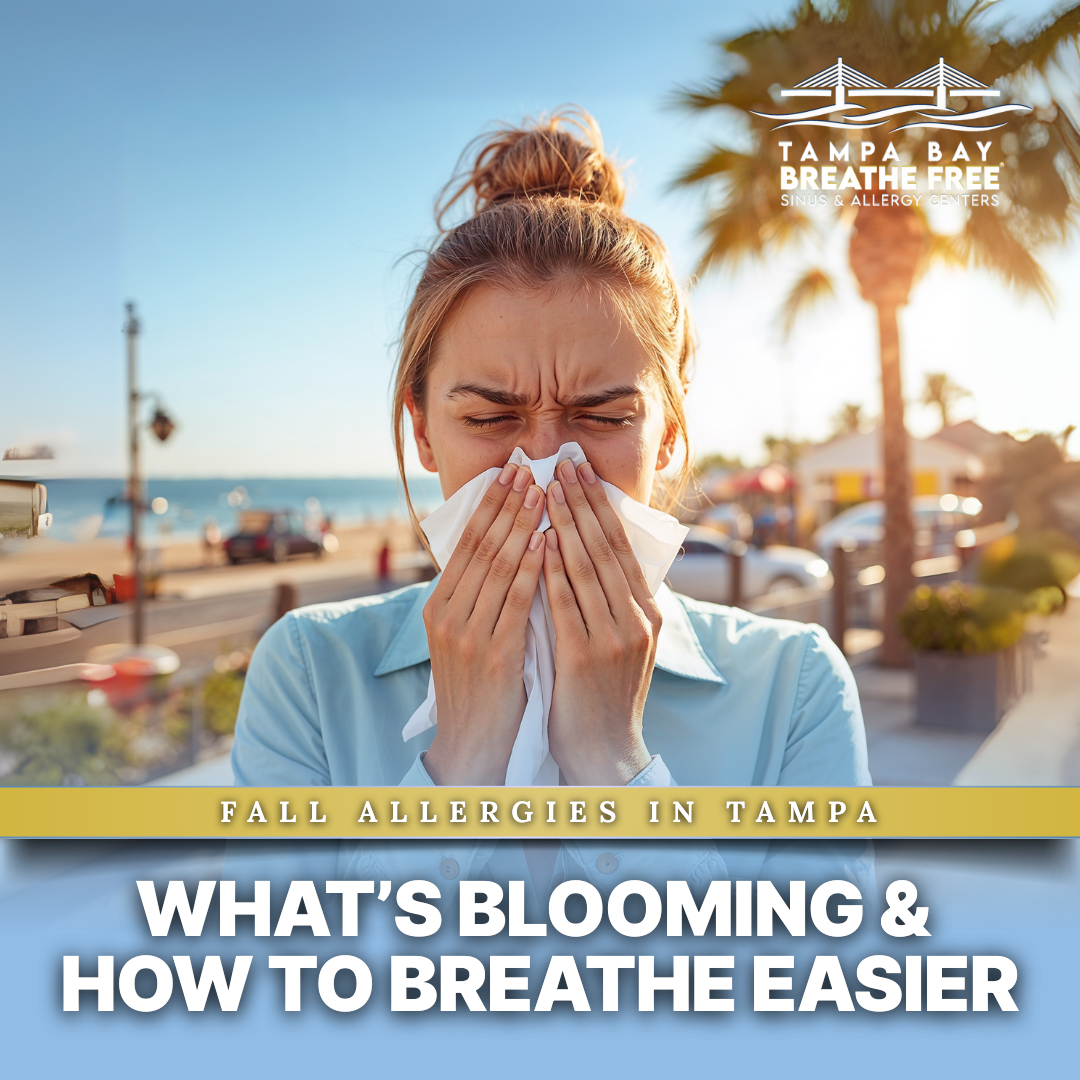.png)
Fall Allergies in Tampa: What’s Blooming & How to Breathe Easier
Tampa, Florida, is known for its sunshine, year-round warmth, and coastal beauty — but for many residents, it’s also known for persistent allergies. Unlike other parts of the country where cold weather offers a seasonal break, Tampa’s extended growing season and humid climate mean that allergens thrive for much longer periods.
As fall arrives, so does another wave of allergy symptoms — but understanding what’s causing them and how to manage exposure can help you breathe easier.

What Causes Fall Allergies in the Tampa Bay Area?
Fall is a prime allergy season in the Tampa Bay area, and while the weather remains warm and pleasant, it also supports the growth and spread of multiple allergens.
Key Fall Allergy Triggers in Tampa:
- Ragweed pollen – A dominant trigger during fall, ragweed pollen travels easily and can linger in the air through November or even December.
- Oak and pine pollen – Though typically more active in spring, these trees may begin releasing pollen earlier in Florida’s warmer climate.
- Mold spores – As leaves fall and decompose, mold levels can increase. Mold thrives in damp, humid environments, especially after rain or in areas with poor drainage.
- Dust mites – Common in Florida homes due to high indoor humidity, dust mites can trigger year-round symptoms but often peak during the fall as we spend more time indoors.
Common fall allergy symptoms to keep an eye on:
Allergy symptoms during the fall can often be mistaken for a cold or sinus infection. Be on the lookout for:
- Sneezing
- Clear, runny nose
- Nasal congestion or pressure
- Itchy or watery eyes
- Scratchy or irritated throat
- Cough or postnasal drip
- Mild headaches
- Fatigue or sleep disruption
If symptoms persist for more than a few weeks or worsen during the same time each year, it may be time to speak with a provider.
How to Manage Fall Allergies in Tampa
While you may not be able to avoid allergens completely, proactive steps and targeted treatments can reduce exposure and minimize symptoms.
✅ Stay Informed About Pollen Levels
- Monitor daily pollen counts using pollen.com or weather apps like AccuWeather.
- Plan outdoor activities during late afternoon or evening, when pollen levels are typically lower.
- On high pollen days, limit outdoor exposure if possible.
✅ Reduce Indoor Allergen Exposure
- Keep windows and doors closed, especially during windy or high-pollen days.
- Use an air purifier with a HEPA filter to reduce airborne allergens indoors.
- Vacuum and dust regularly, focusing on carpets, curtains, and upholstery.
- Wash bedding weekly in hot water to eliminate dust mites.
- Maintain indoor humidity between 30–50% to discourage mold and dust mites.
✅ Clean Up After Outdoor Exposure
- Shower and change clothes after spending time outdoors to remove pollen from your skin and hair.
- Keep pets clean — bathe and brush them frequently, and wipe them down after walks.
- Limit pets’ access to beds and upholstered furniture during allergy season.
✅ Try Over-the-Counter Relief Options
- Antihistamines to block allergic responses
- Nasal corticosteroid sprays for inflammation
- Decongestants for short-term relief of sinus pressure
- Eye drops for itching and redness
- Pain relievers for allergy-related headaches
⚠️ Talk to a pharmacist or healthcare provider before starting any new medication, even if it’s available over the counter.
✅ Explore Professional Allergy Care
If you’ve tried lifestyle changes and OTC medications but still experience symptoms, it may be time to consult with an allergy specialist.
Professional options include:
- Allergy testing – Identify your specific allergy triggers through personalized testing.
- Customized treatment plans – Based on your symptoms, triggers, lifestyle, and overall health goals.
- Sublingual immunotherapy (SLIT) – Also known as allergy drops, SLIT is a long-term treatment approach that may help desensitize your immune system to specific allergens over time.
Note: SLIT is not FDA-approved for all allergens. Your provider can determine if it’s appropriate for your condition.
Allergy Relief in Tampa with Tampa Bay Breathe Free
At Tampa Bay Breathe Free Sinus & Allergy Centers, we understand how allergies can affect your daily life — from disrupted sleep and fatigue to sinus pressure and ongoing congestion.
Our team offers comprehensive allergy evaluations, including testing and evidence-based treatments tailored to your needs. Whether you're dealing with fall pollen, mold, or indoor allergens, we’re here to help you breathe easier.
📅 Ready to Take Control of Your Allergies?
Schedule a consultation with our team at Tampa Bay Breathe Free to learn more about your options and get on the path to long-term relief — right here in Tampa, FL.
The information provided in this article is for informational and educational purposes only and does not constitute medical advice. It is not intended to diagnose, treat, cure, or prevent any disease or medical condition. Always seek the guidance of your physician or other qualified healthcare provider with any questions you may have regarding a medical condition or treatment.
Results may vary: Treatment outcomes and health experiences may differ based on individual medical history, condition severity, and response to care.
Emergency Notice: If you are experiencing a medical emergency, call 911 or seek immediate medical attention.




